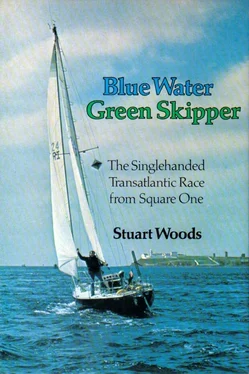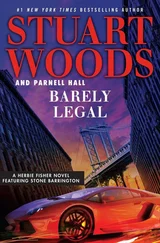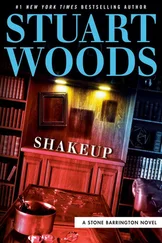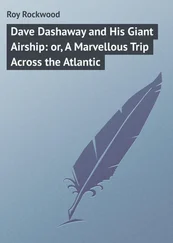But I had others. I was reasonably bright; I had a little money; I had about nineteen months to find a boat, learn to sail it, learn to navigate it, and to get fit; and above all, I was, just about as much as any man can be, free. That was a very important consideration.
When I was very young I wanted to get married very badly, but I got over it. I had a couple of close scrapes, mind you, but I managed to stay out of serious trouble. We are all taught that, generally, when between the ages of twenty-one and twenty-five, each of us will meet some Wonderful Person for whom he was destined, then marry, live in a nice house with two cars in the garage, have 2.5 children, and live happily ever after. During my twenties, by a process I can describe only as luck, I managed to become gradually disabused of this notion, and by the time I was about thirty it had occurred to me, first, that there was a possibility that I might, indeed, never get married; and second, that that might not be an unbearably unpleasant way to live. I try to keep an open mind about this, but nothing has yet happened to change it.
So I was free, that is to say, single; neither did I have any burning professional ambition beyond finishing my novel, nor was I burdened with unmanageable debt. My mother being a good businesswoman who had just inherited the family business, I had no one to support but myself, and I had been doing that nicely in just two days a week for some time. I was a fortunate man.
Perhaps I was also a slightly insane one. I thought a lot about what my problems would be. I could meet the physical demands, I thought; I could become fit. But what about the emotional demands? Could I spend several weeks alone at sea in a small boat without the top of my head coming off? Well, I had taken a rather cold plunge moving from Knightsbridge in London to Gort in the west of Ireland. It had taken some getting used to, but I now spent the greater part of my time alone, working on the novel or reading, mostly about sailing. The two days a week in Dublin kept me in touch with real life and the opposite sex, but basically it was a solitary existence.
Most of all, it seemed to me, I faced two things: a problem of organization and an intensive learning experience. There was a lot to bring together in a short time, but I am a compulsive organizer, being a Capricorn; I find it intensely satisfying to bring order out of chaos, and I am good at it. Lately, the only outlet for this compulsion had been the Galway Bay Sailing Club, to the bemusement of its membership. But what about the learning? Quite apart from boat-handling technique, there was a considerable amount of academic knowledge to absorb, particularly celestial navigation, which involved mathematics, and I could not count to a hundred without stopping to think. I had been a slightly better-than-average student at Manchester High School and no better than average at the University of Georgia. Still, I had learned enough about several score of products and companies to be able to write advertising for them; in New York I had become a competent amateur photographer; in London I had learned more than a little about wine. Neither was an uncomplicated subject. If I was enthusiastic about the subject, I could learn.
I wrote to the Royal Western Yacht Club for the rules of the race, and I began to look for a boat. Finding nothing in the Irish newspapers, I decided to return from Dublin to Galway the long way and make a few stops. I drove south to Wicklow, stopping at Neil Watson’s boatyard. When a boat changes hands in Ireland, Neil Watson often has a hand in the deal. He is the country’s most enthusiastic yacht broker and a nice man as well. Neil showed me a variety of craft in his yard. There were a couple of Trappers (not enough interior space, not enough beam), a French Etap (too small), a pair of Irish-built fiberglass boats called Kerrys (interesting, but freeboard a bit low) and a Comfort 30, a half-ton cruiser-racer, also built in Ireland. This, I thought, was more like it, but it was too expensive, even secondhand. On top of the original cost of the boat there was a lot of extra equipment to be bought. I would have to make do with something smaller.
I drove on to Cork, partly to stop at a favorite country hotel, Ballymaloe House, and partly to see what I could find out about a young New Zealander yacht designer, Ron Holland, about whom I had been reading in the yachting press. He had designed a successful one-tonner, Golden Apple, had followed her with a half-tonner, Golden Shamrock, and now a production version of Shamrock was to be built. Ron Holland was not listed as having a telephone, and I couldn’t remember the name of the boatyard which was building his design. It turned out to be Southcoast Boatyard, and I eventually found a small office building, a large shed, and the beginnings of some sort of construction behind the office.
In the office I was directed to the foreman, George Bush, whom I found in the shed, deploying workers around the upside-down wooden hull of a boat in building. George, who wore glasses and a permanently astonished look, explained that Ron Holland was in the United States. He showed me the hull he was working on, which was to be the “plug” around which a mold would be constructed for the new glass-fiber boat, and gave me a look at Golden Apple, which was resting on a cradle near the river. He was very proud of Golden Apple, as well he should have been. We talked a bit more, and I left the yard with a clutch of Xeroxed typed pages about the new boat and a promise from George that he would tell Ron Holland of my interest in the boat when he returned from the States. But a production Golden Shamrock cost £9,700, and was out of my range.
I continued to West Cork, to Skibbereen, to visit Fastnet Yachts, which turned out to be another tin shed, seemingly in the middle of a farm and nowhere near any water I could see. But there was an astonishing number of boats crammed into this shed, among them a Hurley 24, which interested me. It looked good, and it was within my budget. It was suggested that I have a look at another Hurley 24 in Monasterevin, near Dublin, which had been at the Dublin Boat Show. I did, a few days later, and was very interested.
Not having any objective information about the Hurley, I telephoned Yachting World magazine in London and was connected with David Pelly, the assistant editor. He told me that Hurley was a reliable firm that, due to business difficulties not connected with the quality of its product, was in receivership. He spoke well of the 24, calling it a very seaworthy boat for its size and well designed. I telephoned Hurley’s in Plymouth and talked with the sales manager, learning that they had sent the Monasterevin boat to Ireland for the boat show, where it had not been sold, and in the meantime, the company had gone into receivership. The receiver was insisting that the boat be either sold soon or brought back to England. I began to smell a genuine, gold-plated bargain.
Back in Galway I noticed in the Royal Ocean Racing Club’s magazine, Seahorse, that a Hurley 24 had been sailed in the Round Britain race by Captain Ewan Southby-Tailyour of the Royal Marines. Hurley’s gave me his telephone number, and I rang him, slightly uncomfortable because I was not quite sure how to pronounce any of his names. He turned out to be an enthusiast in general and, in particular, about his Hurley 24, Black Velvet . He was planning to do the OSTAR in her.
I had in my hand a copy of the rules, which had just arrived in the post. I mentioned a rule that was worrying me. The committee, it said, was unlikely to accept anything under twenty-five feet overall on deck for the race. Ridiculous, said the captain, they had said the same thing about the Round Britain Race, but he had been accepted. I felt better about it now, and we talked of meeting in London at the boat show in January. Nevertheless, after I hung up I wrote to the committee, asking about the acceptability of the Hurley 24 and reminding them of Captain Southby-Tailyour’s performance. I received a courteous note back from the club secretary, saying that they knew Ewan Southby-Tailyour well, but he felt it was unlikely that the committee would accept the Hurley 24. I wrote back and asked for a ruling, remembering that the committee had, in past times, been known to reconsider an entry.
Читать дальше












